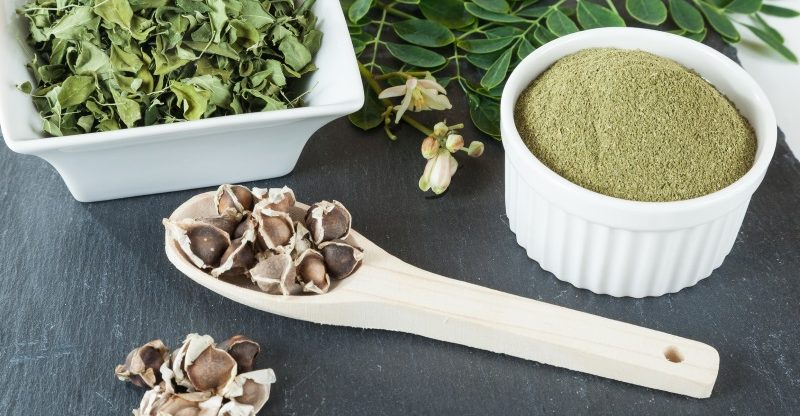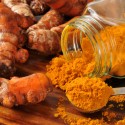19 Evidence-Based Benefits of Moringa
You may be asking yourself, what is moringa?
If you have not heard of this plant, you are not alone.
However, it is an amazing powerhouse of nutrition that has the potential to provide for many unmet human needs.
As an herbal supplement, moringa is quickly becoming the next superfood because of its nutrient density.
If you want to improve your health, end chronic illness, and prevent future disease, moringa can help.
Keep reading to learn why this plant is something you should start using.
What is Moringa?
Moringa, or Moringa Oleifera, is native to India and the Himalayas but now grows in many parts of the world.
It is known by many other names, including the Ben oil tree, the Horseradish tree, Munga or the Drumstick tree.
This tree and its parts have been used for centuries in Ayurvedic medicine, treating and preventing hundreds of diseases (1).
It was once also used to make beauty products in ancient Egypt.
The wonderful thing about the moringa tree is that nearly all parts of the plant can be used to create something beneficial to our health.
While the leaves are most commonly used, even the seeds, flowers, roots, and bark can be used in healing ways.
The leaves are prized for their high concentrations of vitamins, minerals, amino acids and antioxidants (2).
They have been used to improve nutritional deficiencies and supply proper nutrition for millions of people.
Healers have used moringa roots and seeds to treat infections, fight microbes and purify water (3).
The oil, known as Ben oil and found in the seeds, is an excellent source of oleic acid (4).
The secrets of moringa were only known in Asia, until recently.
This is when researchers and medical scientists became curious about this herbal supplement and how it was being used to treat illnesses in smaller communities and more isolated regions of the world.
Powdered moringa leaves are now available in health food establishments, and it has grown in popularity.
There has been increased research into the use of moringa.
However, more clinical trials are required.
There have been animal studies on the use of this plant, and practitioners know a great deal from decades of anecdotal evidence.
However, more research is needed to confirm the results that are discussed below.
History of Moringa
There are many different varieties of the moringa tree.
However, Moringa oleifera is the most widely utilized for nutritional purposes.
This fast-growing species, is tall and leafy, producing a pod as well as flowers.
This tree grows well because it can survive in harsh conditions, including in dry and depleted soils.
Due to its ability to survive in these conditions, it has become a valuable source of nutrition in areas where food does not otherwise readily grow.
Practitioners of Ayurvedic medicine have used parts of the moringa tree for over 4,000 years to heal and treat the human body.
It has also spread in popularity to other parts of the world, including areas with a high incidence of famine.
In areas where it is grown, the moringa tree can actually help to restore the soil and help in plant restoration efforts.
The pods of the tree can be used to purify water and draw out toxic or harmful compounds.
Since it grows year-round, it is always working to replenish soil nutrients.
Nutrition and Bioactive Compounds
Moringa is unique among plants and herbs because so many parts of the plant can be used to fight disease and supply adequate nutrition.
The leaves remain the plant’s most potent form of nutrition, which is why most supplemental moringa available today comes from the dried leaves.
Moringa leaves are packed with nutrients, including protein, antioxidants, Vitamins A, B1, B2, B3, C, and E, potassium, iron, and calcium.
The amount of Vitamin A is so concentrated that it is given to children with severe nutritional deficiencies to improve their health and support their immune system function.
Moringa also improves your health because it has fiber, essential amino acids, proteins, polyphenols, flavonoids, and isothiocyanates, which will be explained below, as we uncover the health benefits of this miraculous plant.
How to Use Moringa
You can purchase moringa in a variety of forms.
It is available as an extract or tincture, fresh leaves of seeds, ried leaf powder, capsules, tea, oil or in dried bark or root form.
It is also available in products, including lotions and face creams.
To get the advantage of moringa in your diet, this product can be enjoyed in a number of ways.
You can drink tea made from the dried leaves steeped in hot water.
You can also take moringa capsules, which contain dried and ground leaves.
It is best to take the capsules with food.
You can use the oil from the seeds to cook with, or you can place this liquid directly onto your skin.
There is no set dosage for moringa, but it recommended that you take between four and 30 grams per day of dried leaves.
You should take smaller amounts of the extracts since they have a higher concentration of the bioactive compounds.
It is best to start with a small dose of moringa (around one-half of a teaspoon) and then add slightly more each day.
This will give an indication of how much can be tolerated.
Some people experience stomach upset and choose to take it every other day, instead of daily.
You will have to find what works best for you.
Moringa’s Health Benefits
Treats Diabetes
Elevated blood glucose levels can become a serious health problem and lead to long-term, chronic disease, especially diabetes.
When blood sugar is high for a prolonged period of time, your risk of developing heart disease rises.
It is crucial that you keep your blood glucose levels within healthy limits if you want to maintain your health.
Moringa may be able to help you to do that.
Moringa has been shown to successfully lower blood sugar levels, decrease glucose intolerance, reduce HbA1C levels and increase insulin production.
This means it could help those with Type 2 diabetes (or those who are in danger of developing diabetes) to control their blood sugar levels.
In a 2011 study, moringa leaf tablets successfully improved glucose and HbA1C levels in 60 patients with Type 2 diabetes (5).
This result was achieved in three months of treatment. In another study, moringa was also helpful in lowering glucose levels for those on a high-carb diet (6).
A dose of four grams per day supplied results, after just one day of treatment.
In animal trials, moringa was shown to help improve fat burning and weight loss efforts, primarily due to its ability to lower blood sugar levels and improve insulin resistance (7).
By preventing diabetes, this herb could help to control weight gain and reduce fat levels, inflammation, and oxidative stress over time (8).
This is possibly due to its ability to activate PPAR-alpha cells, which assist in burning fats and keeping sugar levels regulated (9).
These results were confirmed by other clinical trials and animal studies (10, 11, 12).
Researchers believe the mechanism of action comes from the isothiocyanates found in the moringa plant (13).
However, not all studies confirm these results.
Therefore, more research is needed to determine if moringa could become a long-term treatment option for managing or preventing diabetes.
Improves Your Heart Health
Your heart health is dependent on many factors, including blood cholesterol levels, blood pressure, blood glucose levels, oxidative stress levels and levels of triglycerides.
Moringa can be used to control several of these factors, thus leading to improvements in your overall heart health.
For example, moringa can help to reduce total cholesterol, as well as LDL or “bad” cholesterol levels, while also increasing levels of HDL or “good” cholesterol (14).
Keeping lipid levels under control is crucial for preventing heart disease and keeping your heart healthy and strong.
These same results were noted in animal trials, include reducing triglyceride levels in animals that were eating a high-fat diet.
Lowering lipid levels can help to prevent atherosclerosis, which contributes to heart damage (15).
The mechanism of action is likely the elevated levels of antioxidants, which decrease free radical damage.
In other animal trials, the moringa leaf was found to improve another important marker connected to heart health.
Subjects experienced reduced blood pressure and heart rates (16).
The isothiocyanate glycosides in Moringa are thought to cause this effect.
Based on both animal and human trials, moringa could be used to treat conditions that are related to an elevated risk of heart disease.
As we learn more about this herb, the inclusion of it in a heart-healthy diet and lifestyle looks promising.
Provides Nutritional Support
If you are prone to nutritional deficiencies, because of chronic disease or genetic issues, you may receive help from regular moringa supplementation.
This herb is often used for malnourished children or for those who have difficulty gaining weight.
Vitamin A is an essential nutrient for a healthy immune system.
Moringa is an excellent source of this vitamin.
Children who are given this supplement have been shown to improve their Vitamin A levels in six weeks (17).
This herb is an excellent plant-based source that can be used for all types of diets and is safe for children to take (18).
Moringa can also be used to treat anemia, which is the result of a low iron blood count.
This herb is an excellent natural source of iron.
In one study, it was shown that Moringa seeds were able to increase hemoglobin levels in just three weeks (20).
For those with chronic illnesses, like HIV, getting proper nutrition is extremely important in supporting your immune system.
Moringa can help with this.
One study found that patients with HIV undergoing treatment took moringa for six months and improved their nutritional levels significantly (21).
In animal trials, subjects taking moringa were also able to gain weight through improved nutrition (22).
Fight Free Radicals and Oxidative Stress
One of the many health benefits of moringa is the result of its high concentration of antioxidants.
Oxidative stress is a leading cause of illness and chronic disease, so protecting our bodies from this process is crucial to long-term health and vitality.
In animal trials, moringa was shown to reduce oxidative damage (23), while restoring glutathione levels (24).
Lowers Inflammation
The leaves, bark, flowers, and root of the moringa plant are all found to have anti-inflammatory properties, which make it helpful in treating chronic diseases that result in excess inflammation (25).
By reducing inflammatory markers, like TNF-alpha, IL-6, and IL-8, moringa could also control gene activation for those that are involved in the inflammatory response (26).
Controlling inflammation in the digestive system provides many benefits.
It can help to reduce gut damage from chronic diseases (27), lead to improved digestion, improve the function of the immune system (28) and reduce overall pain and inflammation associated with chronic bowel diseases (29).
Fights Infections
In cell studies, various parts of the moringa plant were found to effectively kill several types of pathogens, including parasites, fungi, and bacteria.
This includes effective killing some difficult-to-treat strains of bacteria, including Staphylococcus aureus (30).
As a natural antiseptic, moringa could be used as hand sanitizer or soap, protecting your skin from bacteria, similar to industrial soaps (31).
Improves Breastfeeding Productivity
In Ayurveda, moringa has long been used to help boost breast milk production and increase the nutrition of breast milk for infants (32).
The herb works by increasing the production of prolactin, allowing infants to gain more weight (33).
Strengthens and Supports Muscles
As a source of plant-based protein, moringa can provide your body with 19 amino acids, including several that are essential for health and good muscle growth (34).
The proteins in Moringa are easily absorbed by the body (35), making it an excellent supplement for those who adhere to a vegan diet or who are looking to increase muscle strength or stamina (36).
Provides Respiratory Support for Asthmatics
By reducing airway inflammation, moringa can help those who suffer from asthma.
In one study, taking powdered seed kernels resulted in reduced asthma symptoms in three weeks (37).
It may also be able to reduce Th2 pro-inflammatory enzymes that are overreactive in people living with allergic asthma (38).
Moringa has been found to reverse the imbalances of Th1 and Th2 proteins that lead to inflammation and reduce airway flow (39).
Helps Fight Cancer
In cell studies, moringa was shown to inhibit the growth of various types of cancer cells.
The potent antioxidants found in the herb are the likely reason for this effect.
The strong cancer-fighting compounds found in all parts of the moringa tree could be used to help treat or even prevent cancer, including breast, colon and skin cancer (40, 41).
The herb is able to prevent cell division in cancer cells, causing the cells to die by apoptosis, rather than necrosis (42).
Provides Neuroprotective Benefits
By reducing inflammation and oxidative stress in the brain, moringa could provide protection for your neural pathways and help to reduce the damage done by aging and neurodegenerative disorders, like dementia.
It has shown promise in reducing the oxidative stress and impaired cognition found in Alzheimer’s disease (43).
It could also help to reverse the cognitive impairment and memory loss experienced by those with other forms of dementia (44).
Moringa may also help with other forms of brain inflammation, like that associated with Parkinson’s disease (45).
In addition to slowing damage, moringa has also been shown to increase neural connections and branching, which could improve memory as well as cognition (46).
Enhances Immune System
By increasing white blood cell production and antibodies, moringa leaf could stimulate your immune system response and help you fend off disease (47).
By suppressing the inflammatory response, moringa can help your immune system respond more appropriately to pathogens, giving you a better chance at fending off disease (48).
Protects Against Heavy Metal Toxicity
Heavy metals, such are arsenic, are increasingly found in water and food sources around the world.
When consumed, these heavy metals are stored in your body and can lead to toxicity over time.
Arsenic contamination is becoming more of a problem, as certain foods are exposed to this heavy metal in groundwater.
Long-term exposure to this toxin can lead to heart disease and cancer (49).
The moringa plants may be able to protect your body from the effects of arsenic poisoning. However, more research is needed to understand this effect (50).
Additional Benefits of Moringa
- Moringa may protect your skin from damage and aging. In a study using a cream which contained moringa leaf extract, participants noted enhanced skin texture, smoothness, and volume, while also experiencing a decrease in wrinkles, roughness, and scaliness (51).
- Moringa may treat urinary tract infections (UTIs). Moringa bark was shown to resolve symptoms of UTIs in a small study involving 15 people. This is likely due to moringa’s ability to reduce inflammation, which causes many of the symptoms associated with this type of infection (52).
- This herbal supplement may help to reduce the occurrence of seizures in those with epilepsy, according to one animal trial. This is likely due to the flavonoids found in moringa, which can increase GABA, which helps to relax the brain and enhance the sending of signals which regulate its function (53).
- Moringa may be able to protect your liver from damage. In recent research, this herb was shown to provide some protection for the liver from toxins and support healthy liver function (54).
- It could be used to help treat depression. In animal trials, moringa was able to activate serotonin in the brain and, in combination with traditional antidepressants, improve depression symptoms (55).
- Moringa may also be able to help detoxify the body. Taking this herb has been shown to increase the production of specific enzymes in the body that are important for detoxification, thus protecting you from toxins (56).
Precautions
In clinical studies of moringa, no significant adverse effects were discovered, when doses were kept below 20 grams per day.
While it can be safer at higher doses, its bitter taste makes it difficult to take in larger quantities (57).
There is some evidence that moringa root can induce abortions, so pregnant women should avoid taking this herb, especially in the early stages of pregnancy (58).
In animal trials, moringa was shown to affect the metabolization of some drugs, so it should be used with caution if you are taking medications for cholesterol, seizures or fungal infections.
It was shown to increase drug levels for medications to treat tuberculosis (59).
Because moringa can reduce blood sugar levels, you should check your blood sugar closely while taking this herbal supplement, especially if you have hypoglycemia or are on diabetes medications.
Conclusion
Moringa is growing in popularity due to its many benefits for both physical and mental health.
This herb is safe to use and produces few adverse reactions.
This makes it a perfect option for treating a wide range of medical issues.
The use of moringa has been shown to be effective for treating diabetes, improving heart health and providing adequate nutrition to those who are malnourished.
It is also effective for improving immunity and gut health, fighting cancer and helping those with asthma to breathe easier.
Moringa’s benefits also include protecting the brain, strengthening muscles and helping to make breastfeeding easier.
If you are curious about what moringa can do for you, invest in one of the many different supplements that are available today.
Adding moringa to your daily health regimen is easy.
It could have you feeling better and stronger in no time.
Why wait? Try moringa today!
FDA Compliance
The information on this website has not been evaluated by the Food & Drug Administration or any other medical body. We do not aim to diagnose, treat, cure or prevent any illness or disease. Information is shared for educational purposes only. You must consult your doctor before acting on any content on this website, especially if you are pregnant, nursing, taking medication, or have a medical condition.
HOW WOULD YOU RATE THIS ARTICLE?





